Natasha Roggi had a skiing accident that required surgery to her knee and shoulder. She credits Dr. Katherine Coyner and Dr. Allison Schafer for moving her forward in healing and getting back to her active lifestyle.
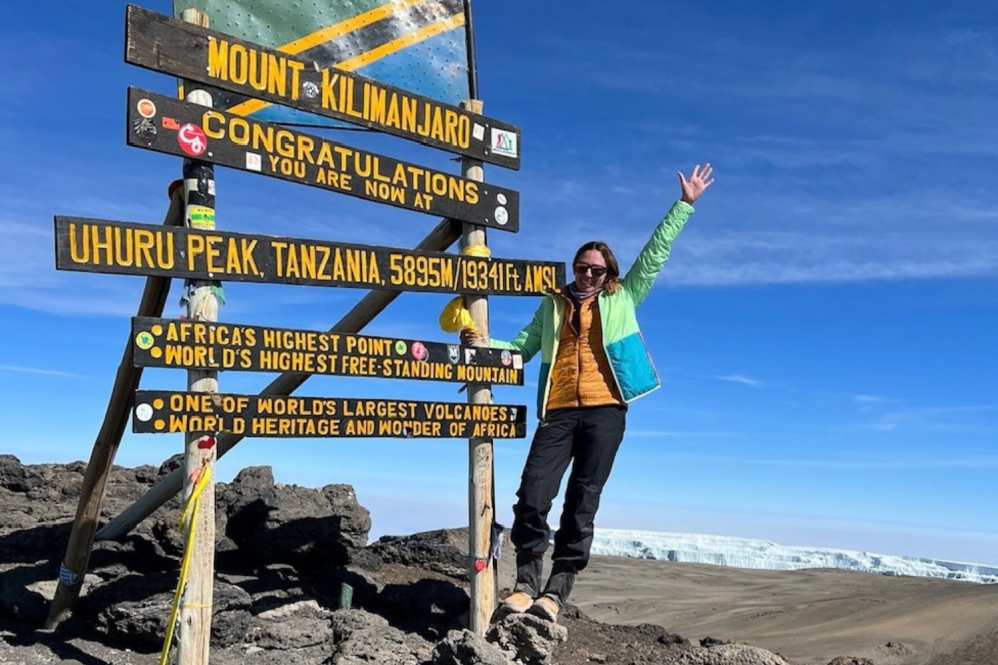
Natasha Roggi climbing Mount Kilimanjaro
The Women's Center for Motion and Performance at UConn Health (WCMP) led by Dr. Katherine Coyner, the director, and Dr. Allison Schafer, the medical director, both from UConn Health Orthopedics and Sports Medicine launched this past spring. The goal of the WCMP is to empower women to maintain an active lifestyle through every stage of life. Specializing in the unique orthopedic needs of women, from young athletes to women as they age.
Women face specific orthopedic challenges due to anatomical and hormonal differences. Issues like ACL tears, patellofemoral pain syndrome, concussion, osteoarthritis, osteoporosis, and joint degeneration are more prevalent as they age. The WCMP provides comprehensive care for women of all ages, regardless of activity level.
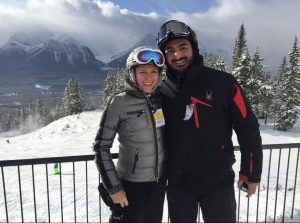
Natasha Roggi, a UConn alumna '05, active 40-year-old mom and lifelong athlete has been under the care of Schafer and Coyner. In December of 2022 she had climbed Mount Kilimanjaro and earlier that year had skied the Swiss Alps, but on February 12, 2023, it was an icy run on Stratton Mountain in Vermont, she went off trail and landed in a ditch.
Initially she knew her shoulder was dislocated, something that has been an issue for her throughout her life. Ski patrol took her to the clinic and fixed the dislocation, when she stood up for an X-ray, her legs buckled, and she knew something was wrong with her knee.
It just so happened she already had a scheduled appointment the following day with her primary care physician, Dr. Erica Waddington, assistant professor of Family Medicine at UConn Health who referred her to Schafer. Schafer shared the bad news with her at triage, that it wasn't going to be a great year for her.
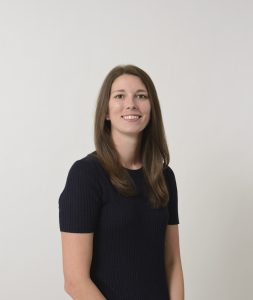
"She was honest, and I appreciated it, even though it wasn't what I wanted to hear," says Roggi.
The anterior cruciate ligament (ACL) was torn and Coyner performed a quadriceps tendon autograft, a surgical procedure that uses a patient's own quadriceps tendon to replace or reconstruct a torn anterior cruciate ligament (ACL) in the knee. The quadriceps tendon is a thick tissue that connects the muscles to the kneecap and extends and stabilizes the knee.
Roggi was diligent about her physical therapy starting with range of motion and in six weeks the brace came off and the crutches went away.
Now it was time to address the issue of the shoulder dislocating regularly and in early December of 2023, Coyner performed a remplissage procedure, an arthroscopic surgery that helps with shoulder instability and recurrent subluxations.
Your Health, Our Passion: Explore personalized care that adapts to you at The Women's Center for Motion and Performance
"We employ the latest surgical techniques that are less invasive and promote faster recovery," says Coyner. "This includes arthroscopic procedures for ACL and shoulder repairs which minimize tissue damage and speed up the healing process."
Roggi was in an arm brace for six weeks and began physical therapy but at four and half months out she suffered from adhesive capsulitis, also known as frozen shoulder or shoulder contracture. This is a condition where the shoulder joint capsule becomes inflamed and thickens, causing scar tissue to form. This scar tissue restricts movement in the joint, causing pain and limited motion.
"I have never been injured like this before and was not prepared for how much I would be knocked down," says Roggi. "I connected right away with Dr. Coyner and knew she would get me through, she was always thinking and working toward solutions."
When Roggi came back in April to have her knee scoped to clean out scar tissue, Coyner suggested that she also go in and manipulate the scar tissue in the shoulder at the same time.
"What a difference that made, she did amazing, completely freeing up the scar tissue," Roggi commented.
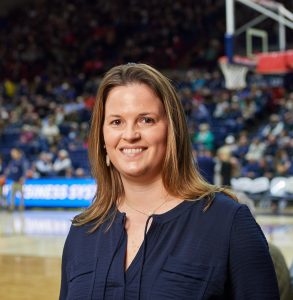
"Post-surgery rehabilitation is tailored specifically for each patient's needs, lifestyle, and goals. We ensure that recovery plans not only aim to restore function but also prevent future injuries by strengthening the muscles and joints involved," explains Coyner.
The multidisciplinary, collaborative approach at the WCMP includes specialties in orthopedic surgery, and primary care sports medicine, as well as psychology, lifestyle medicine and weight management, neurology, osteoporosis and bone health, and physical therapy. The team works together to help patients achieve their personalized goals.
An emphasis is placed on preventative care to help women avoid injuries before they occur. This includes education on proper exercise techniques, lifestyle modifications, and regular health assessments to monitor their physical condition.
Another focus of care at the WCMP is a significant focus of care on improving bone health, especially as women age. Treatments and preventative measures that address bone density loss, helping to prevent injuries like fractures that can be more common in postmenopausal women are integrated into the care plan.
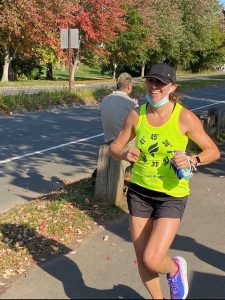
Roggi admits, "it's been a journey, it hasn't been an awesome year and has been tough both mentally and physically. I have to trust the process; sports are my life and I want to get back."
"Our treatment plans integrate multiple disciplines, ensuring that every aspect of a woman's health is considered,' says Schafer. "This includes not only physical but also mental health support, which is crucial for comprehensive care."
Roggi looks forward to returning to running and her active family life with her three young sons and is well on her way with help from the team at UConn Health.
"Every time I meet with someone at UConn Health, I never question their plan and am always happy to see them because they are moving me forward," says Roggi.
The entry point for care at the Women's Center for Motion and Performance at UConn Health is through the nurse navigator, Kayla Nati, whose direct line is 860-679-6330. Appointments are available at the main campus in Farmington, as well as UConn Health's offices in Simsbury and Southington.






